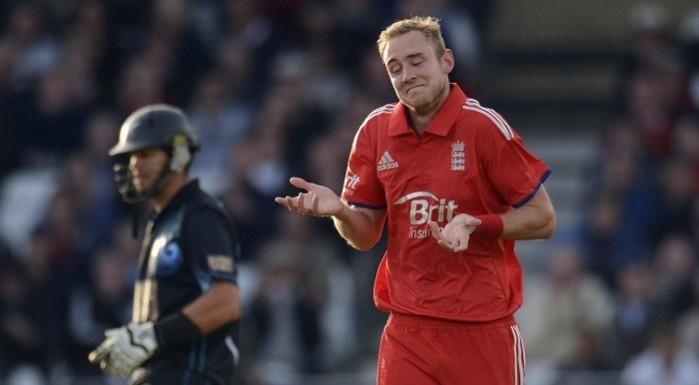
After putting up a competitive 172, England thought they had a good match in hand, till rain stopped play after five overs and New Zealand were nine runs ahead in the Duckworth-Lewis method.
England skipper Stuart Broad was upset with the umpires for not taking off the players when lightning struck in the fifth over and instead waited till rain hit to call off play in the next over. England and New Zealand would have split points had onfield umpires Aleem Dar and Paul Reiffel called it off before five overs were bowled.
"To be as polite as I possibly can be I think it was distinctly average decision-making keeping us on after the first lightning strike at the start of the fifth over, keeping us on throughout that," Broad said. "That over has obviously given us a loss."
Brendon McCullum had to pull away from facing a Broad delivery in the fifth over because the lightning skies distracted the batsman but the umpires later said that they did not notice the lightning.
"I asked the umpires for a bit of clarity on the decision-making at the end of the game and they said they didn't see the lightning and didn't think it was a threat," a frustrated Broad said after the match. "You can guarantee from our team we felt like it was a threat and with a batsman pulling away from a delivery after 4.2 overs I think the batsman saw it as well.
"At the end of the day it's a game of cricket so I wouldn't be putting the crowd and players' safety under threat."
Broad's fifth ball of the fifth over was a dot and scores were level according to the D/L method but McCullum's six on the next ball handed New Zealand the victory. Broad questioned the application of the very method in the shortest format of the game.
"I don't think it works particularly in Twenty20 cricket," Broad added. "I look back to the 2009 Twenty20 World Cup, and a similar incident in 2010; I don't think it particularly works and hasn't been adjusted quite right. It works for One-Day Internationals."
England have suffered due to rain-affected matches in T20 tournaments before as well. In the Caribbean, though they won the title, they lost to the home team due to D/L method and also their match against Ireland was washed out; both of which affected their points and run rate. In their home series in 2009, England were out of the tournament after losing to West Indies, again after rain playing spoilsport.
Broad was hopeful his team could repeat the 2010 success, making the best of the next three games in the group stage.
"Nothing we can do about it now, we just have to win our next three games, simple as that," Broad said. "The way we played tonight there's every possibility we can do that. We're still lacking that one player to go on and get a big 60 or 70 but we've got some guys firing and that's a good thing.
"The World Cup we won in 2010 we lost on D/L in the first game, scraped through against Ireland then we won our next five games to win the competition. We have to have the belief that can happen again."
If England were initiating debates, New Zealand were all but happy with the umpires, and obviously the result. New Zealand bowler Kyle Mills commended his team's performance especially that of McCullum's six-ball 16.
"If Stuart was on the other end of it, he would be more than happy with the decision," Mills said. "In cricket you win some and you lose some, the umpires are trying to make the decisions to the best of their ability. They want to get a full game of cricket on, a judgement call as they see it, and it just so happened that we got another over in the game."



!['He is done with the team now' : Angry Virat Kohli slams the bat, kicks the ground, yells at RCB team as SRH smashes runs [reactions] 'He is done with the team now' : Angry Virat Kohli slams the bat, kicks the ground, yells at RCB team as SRH smashes runs [reactions]](https://data1.ibtimes.co.in/en/full/796956/he-done-team-now-angry-virat-kohli-slams-bat-kicks-ground-yells-rcb-team-srh-smashes.jpg?w=220&h=135&l=50&t=40)











!['He is done with the team now' : Angry Virat Kohli slams the bat, kicks the ground, yells at RCB team as SRH smashes runs [reactions]](https://data1.ibtimes.co.in/en/full/796956/he-done-team-now-angry-virat-kohli-slams-bat-kicks-ground-yells-rcb-team-srh-smashes.jpg?w=220&h=135)

